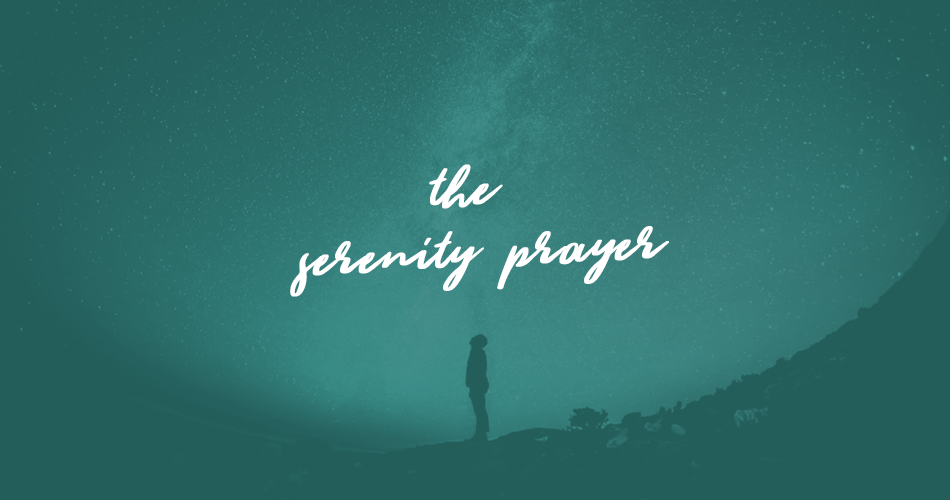The Serenity Prayer is almost certainly the most well-known reading within all 12 step recovery programmes. Where did it come from and what does it mean to me and my programme of recovery?
God grant me the serenity
to accept the things I cannot change;
courage to change the things I can;
and wisdom to know the difference.
– The Serenity Prayer
Like many people new to AA I was kind of freaked out the first few times I actually heard the serenity prayer. It was bad enough that my drinking and using got to the point where I’d finally admitted I needed help and forced myself to head to a meeting. It felt like adding insult to injury, firstly feeling like an outsider at these cold, harshly lit rooms and then to see these strangers all lower their heads at the end of a meeting and uttering a prayer together before getting up, smiling and heading on their merry way. It can be overwhelming if you’re new, especially if like me you have a chequered past with all things religious and spiritual.
The Serenity Prayer is largely credited to American theologian Reinhold Niebuhr, a longer version of the prayer with stronger religious overtones being used at his sermons and church groups throughout the 30’s and 40’s. It was published in the Grapevine (an AA newsletter) crediting Niebuhr in 1948 and quickly became adopted by groups around the world. There’s a great article here that’s worth a read if you want to hear more about the history behind this.
The truth is for a while the prayer just didn’t make any sense to me. I was given a printed copy of the prayer, people would tell me that reading it over and over again was the key to staying sober in the early days. I tried this but the truth was the words just meant very little to me until I started to get more familiar with meetings and the actual principles behind recovery (It probably didn’t help that in my early days I was a physical and emotional wreck and well, just plain crazy).
For this alcoholic and addict I like to think of the prayer in the following way by breaking down each line. This is the way I find easiest to find meaning and use it to help me when I need support in my programme, but please remember that this is just my own interpretation and everyone will have their own way of reading and understanding this:
1 – We have to surrender to God. The clue is in the very first word. God (or a power greater than ourselves, a God of our understanding) has the power, God is everything, not us. If we were the power that could save the day and grant us the serenity we need the prayer would just start with [your name here], right? We have to surrender a power greater than ourselves, not our own self will.
2 – We must practice acceptance. I’ll be writing a more detailed piece about acceptance soon, but for now the best way for newcomers to think about this is to consider that some things are just beyond our control. We can’t change the past, we can’t control the outcome of some situations or change the way other people think or behave, no matter how hard we try. We don’t have to be ok or happy with how a situation has played out in our lives, with something we’ve done in the past or how someone else has behaved, but we do have to accept it.
3- We must have courage. The third line for me is about embracing courage and being able to act throughout our lives and in certain situations from a place of faith, love and positivity and not from fear.
4- Finally the wisdom to know the difference. This was actually the part of the prayer that confused me the most. The prayer first asks us to accept we can’t change anything but also that with courage we can change some things.
So where exactly do we get this wisdom from that helps us know which is which? This is a constant learning process for me in relatively early recovery. I struggle sometimes to understand which circumstances I need to accept and which I should be making steps towards changing, which often happens to me around work situations. If I’m in a situation where a work project is going poorly and the wider team isn’t getting things done, how do I know when to sit back and accept it’s going poorly or when to try and change the outcome through my own intervention?
In my mind I try to first consider that whilst I’m now living a more spiritual life, it doesn’t mean I’m a pushover. If someone isn’t pulling their weight or is in the wrong, we’re able to call them out and look to get the situation resolved. The only difference is we need to approach it in the right way. Previously I would use my forceful nature to push and bully my way through, but now I need to look to resolve tension through a more calm and measured approach. Looking to be empathetic but also clear about where things have gone wrong and being clear that we need to work together to come to a solution to get things back on track. As I said before, it’s about acting from a place of faith, love or positivity and not from fear. We also don’t have to like the situation, but we do have to accept it and look to move on. Ultimately a lot of this is about making sure you’re thinking and ‘doing the next right thing’.
I’ll leave it there.



